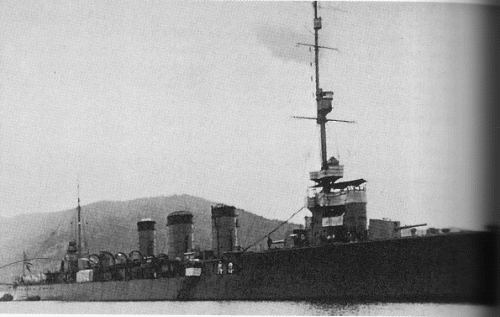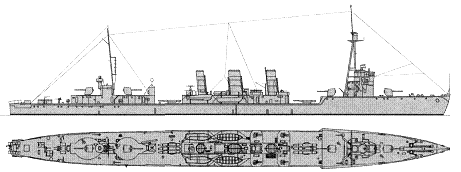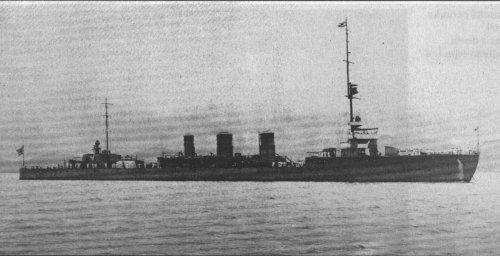
NAVYPEDIA
 Support the project with paypal
Support the project with paypal
Photo

Tenryu 1926
Ships
| Name | No | Yard No | Builder | Laid down | Launched | Comp | Fate |
|---|---|---|---|---|---|---|---|
| 天龍 [Tenryu] | Yokosuka K K | 17.5.1917 | 11.3.1918 | 20.11.1919 | sunk 18.12.1942 | ||
| 龍田 [Tatsuta] | Sasebo K K | 24.7.1917 | 29.5.1918 | 31.3.1919 | sunk 13.3.1944 |
Technical data
| Displacement normal, t | 3948 |
|---|---|
| Displacement full, t | 4350 |
| Length, m | 134.1 pp 142.9 oa |
| Breadth, m | 12.3 |
| Draught, m | 3.96 |
| No of shafts | 3 |
| Machinery | 3 sets Brown-Curtis geared steam turbines, 10 Kampon boilers |
| Power, h. p. | 51000 |
| Max speed, kts | 33 |
| Fuel, t | coal 150 + oil 920 |
| Endurance, nm(kts) | 6000(10) |
| Armour, mm | belt: 63 - 51, shields: 20, deck: 25, CT: 51 - 25 |
| Armament | 4 x 1 - 140/50 3-shiki, 1 x 1 - 76/40 3-shiki, 2 x 1 - 6.5/115, 2 x 3 - 533 TT (12), 48 mines |
| Complement | 327 |
Standard scale images

Tatsuta 1944

Tatsuta 1944

Tenryu 1939

Tatsuta 1919
Graphics
Project history
Light cruisers of Tatsuta class were built under the FY1915 Programme. The design has been developed under the big effect of British Arethusa class cruisers, but thus had a number of the constructive differences, not allowing to consider them as copies of British prototype. Besides Japanese ships had narrower specialisation and intended, first of all, for a role of destroyer leaders while the circle of tasks of Arethusa, besides destroyer leading, included also reconnaissance with a squadron, that is, on terminology of those years, she was scout. In the IJN these functions have shared and simultaneously with designing of leader Tatsuta works on scout, larger and strongly armed ship (this project has formed subsequently a basis for creation of heavy cruisers of Furutaka class) were conducted.
As machinery 3-shaft the geared steam turbine propelling plant with 51000hp power (in comparison with 4-shaft turbines with a direct drive on Arethusa) has been chosen, that together with the big hull L/B rate (more than 11.1) has ensured 33kts speed, on 4kts faster than British ship. For some reasons Japanese designers have not dared to refuse completely coal usage 2 from 10 boilers had mixed coal-oil-firing. 63mm armoured belt covered only machinery (unlike British prototype on which the belt protected practically all the length). The armament structure also had the big differences: the main calibre became uniform 140mm (instead of mixed 152mm and 102mm guns); all guns were installed at centreline, as well as for the first time appeared on the Japanese cruisers triple TTs; 3 AA 76mm/40 guns were also installed. In design of Tatsuta for the first time characteristic "spoon-form" stem has appeared: distinctive line of the majority of the subsequent Japanese light cruisers.
In the mid-thirties it planned to rebuild Tatsuta and Tenryu to AA ships (by analogy to British cruisers of "C" class). Under the design prepared in 1936, all old armaments it was necessary to change to 4x2 127mm/40 DP mounts and 4х3 25mm MGs, 2 DCR and 4 DCT. By 1938 the conversion design was reconsidered, having excluded 127mm mounts in advantage of 2x2 76mm/65. Finally carrying out of scale update have refused, and the ships have entered into the Second World War practically with the same armament, as at the moment of completion (except for light AA).
Ship protection
63mm belt (58.5x4.27m) protected only machinery, its upper part (1.45m) was 51mm thick and lower part (2.82m) 63mm. 25-22mm flat deck connected with upper edge of belt. CT had 51mm sides and 25mm roof.
Modernizations
7.1937, both: - 2 x 1 - 6.5/115; + 2 x 1 - 13.2/76
1940, both: - 1 x 1 - 76/40, 2 x 1 - 13.2; + 2 x 2 - 25/60 96-shiki, boilers were converted to oil burning (fuel stowage was 1070t of oil)
2/1942, both: + 2 x 2 - 25/60 96-shiki
9/1943, Tatsuta: + 1 x 2 - 25/60 96-shiki, 4 DCT, 2 DCR (60), 1-shiki 2-go, 2-shiki 2-go radars
Naval service
Tenryu 18.12.1942 was sunk N off New Guinea by US submarine Albacore. Tatsuta 13.3.1944 was sunk SW off Yokosuka by US submarine Sandlance.
 HOME
HOME FIGHTING SHIPS OF THE WORLD
FIGHTING SHIPS OF THE WORLD JAPAN
JAPAN CRUISERS
CRUISERS TENRYU light cruisers (1919)
TENRYU light cruisers (1919)

